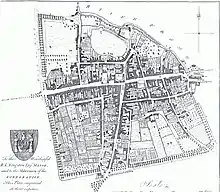
Dorchester Castle was a motte and bailey castle in the market town of Dorchester, Dorset, southern England (grid reference SY692909).
History
The date that the castle was built is unclear.[1] Between 1154 and 1175 it was in possession of the Earl of Cornwall and it had become a royal possession by 1185. Both Henry III and John spent money on the castle.[2] It appears to have been disused from about 1290 and there are references to its stonework being reused by the Chidlock family to build Dorchester Greyfriars in 1309.[2][3][4][5] Certainly it was abandoned by 1422.[6]
Dorchester Prison occupies its site – originally to the north of the town, with a Franciscan Priory further east, but nothing of the castle or the priory remain.[7] However, in 1720, two underground passages were discovered while building a chapel: these once connected the castle to the town proper.[8] In the 1800s, a bastion-like rampart still existed, and a small rampart and ditch were visible on the north and east sides.[8] The gatehouse was built in 1790 and has been designated as a Grade II listed building.[9]
Great Western Railway Castle-class locomotive No. 4090 was named after the castle.[10]
Governors
There are some records of people associated with the castle:
Notes
- ↑ Draper, Jo (1 January 1982). Dorchester Excavations: Excavations at Wadham House 1968, Dorchester Prison 1970, 1975, and 1978, and Glyde Path Road 1966. Dorset Natural History and Archaeological Society. p. 91. ISBN 9780900341106.
- 1 2 Fry, Plantagenet (15 October 2005). Castles: England + Scotland + Ireland + Wales. David & Charles. ISBN 0715322125.
- ↑ Timbs, John (1 January 1872). Abbeys, castles and ancient balls of England and Wales, their legendary lore, and popular history. Re-ed. by A. Gunn. p. 440.
- ↑ "Dorchester Castle". Gatehouse Gazetteer. Retrieved 2 August 2016.
- ↑ Hutchins, John (1868). The History and Antiquities of the County of Dorset (3rd ed.). pp. 362–4.
- ↑ Schofield, John; Leech, Roger, eds. (1987). Urban Archaeology in Britain. ISBN 0906780594. Retrieved 3 August 2016.
{{cite book}}:|website=ignored (help) - ↑ "British History Online". www.british-history.ac.uk. Her Majesty's Stationery Office. 1970. Retrieved 3 August 2016.
- 1 2 3 4 Mackenzie, James Dixon (1896). The castles of England, their story and structure. p. 246. ISBN 9781153325301.
- ↑ Historic England. "The stone gateway forming the north elevation of the gatehouse of the former Her Majesty's Prison Dorchester (1119045)". National Heritage List for England. Retrieved 26 August 2016.
- ↑ "GWR oil - fired locomotives". The Great Western Archive. Retrieved 23 September 2018.
References
- Fry, Plantagenet Somerset, The David & Charles Book of Castles, David & Charles, 1980. ISBN 0-7153-7976-3.
External links
- Historic England. "Dorchester Castle (1386099)". Research records (formerly PastScape).
50°43′01″N 2°26′13″W / 50.717°N 2.437°W